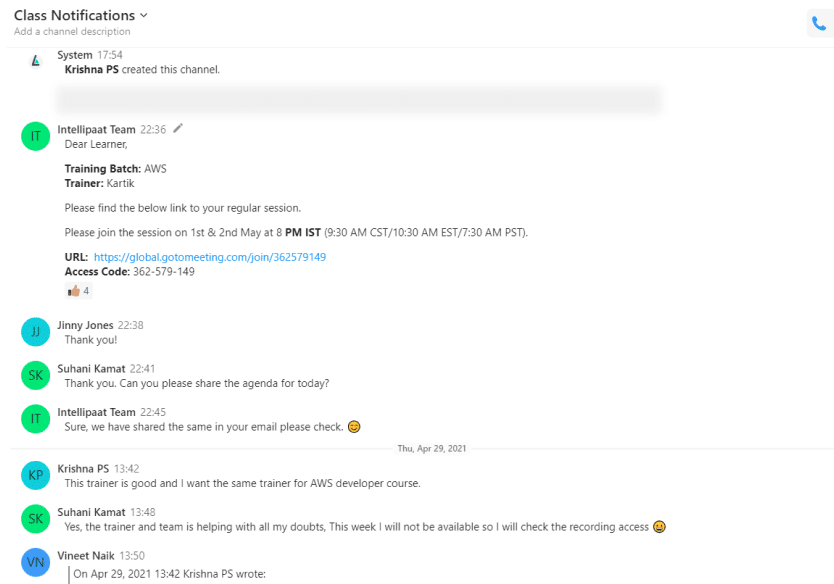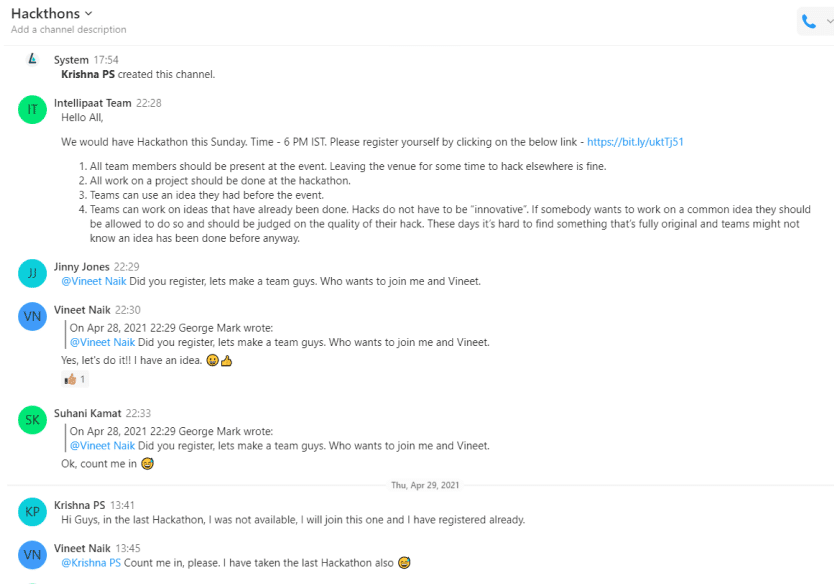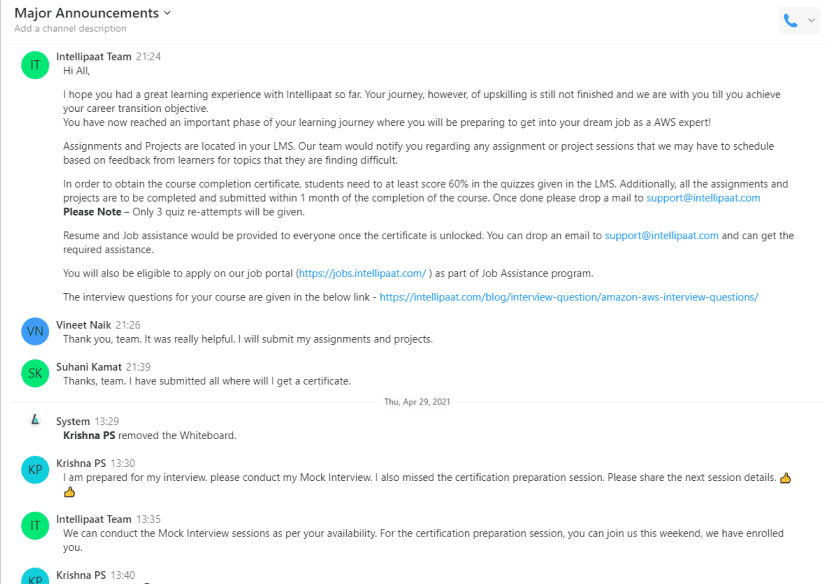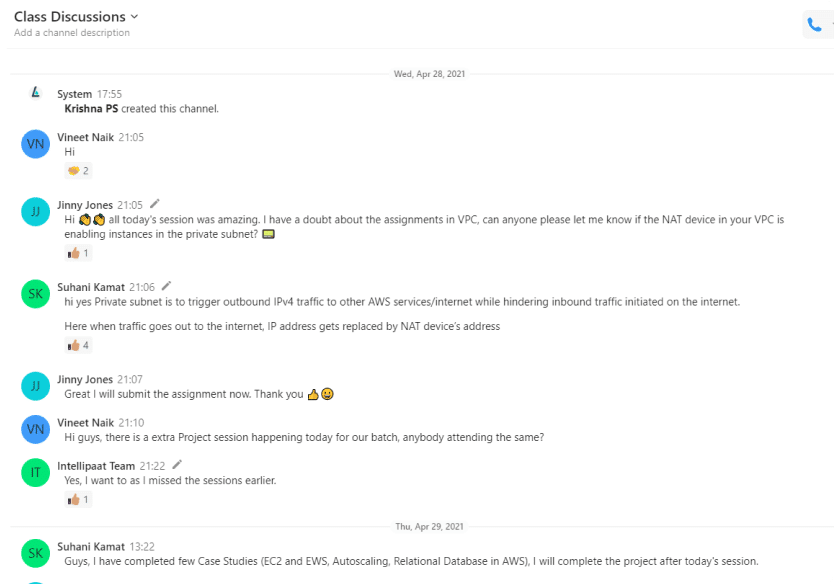Your cart is currently empty.
Our Big Data and Data Science Master’s course lets you gain proficiency in big data and data science. You will work on real-world projects in Hadoop Dev, admin, test, and analysis, apache spark, scala, AWS, tableau, artificial intelligence, deep learning, python for data science, R, splunk developer and admin, NoSQL databases, and more. In this program, we will cover 20 courses and 56 industry-based projects.
Course 1
Big Data Hadoop and Spark
Course 2
Apache Spark and Scala
Course 3
Python for Data Science
Course 4
Tableau Desktop 10
Course 5
Splunk Developer and Admin
Course 6
AI Deep Learning Course
Course 7
MongoDB
Course 8
AWS
Course 9
Microsoft Azure Training
Course 10
Data Science with R
Course 11
Apache HBase
Course 12
Apache Cassandra
Course 13
Couchbase
Course 14
Machine Learning
Course 15
Solr
Course 16
Linux and Java
Course 17
Apache Kafka
Course 18
SQL
Read More
Online Instructor-led Courses:
Self-paced Courses:
There are no prerequisites for taking this training program.
This Intellipaat training program has been created keeping in mind the needs of the industry. You will gain mastery in the complete aspects of data science and Hadoop ecosystem to take on various roles and responsibilities in the big data and data science domains at top-notch salaries.
Talk To Us
We are happy to help you 24/7
Builds and maintains a customized pluggable service-based framework to import, transform, cleanse, and validate data.
Designs, builds, and tests scalable and robust components of the data platform and also offer technical solutions to the respective problems.
Creates data pipelines and comes up with solutions to resolve extremely complex issues.
Pulls necessary data to perform necessary tasks, including business analysis, and developing reports, metrics, and dashboards for performance monitoring.
Works with complex and large data sets, and creates analysis pipelines regularly to gain insights into this data.
Applies various deep learning and machine learning techniques, such as random forests, decision trees, CNNs, and more.
Big Data Hadoop
Apache Spark and Scala
Data Science with R
Python for Data Science
Tableau Desktop 10
Splunk Developer and Admin
Artificial Intelligence and Deep Learning with TensorFlow
MongoDB
AWS
Azure
60 Hours 33 Module
PreviewModule 01 – Hadoop Installation and Setup
Module 02 – Introduction to Big Data Hadoop and Understanding HDFS and MapReduce
Module 03 – Deep Dive in MapReduce
Module 04 – Introduction to Hive
Module 05 – Advanced Hive and Impala
Module 06 – Introduction to Pig
Module 07 – Flume, Sqoop and HBase
Module 08 – Writing Spark Applications Using Scala
Module 09 – Use Case Bobsrockets Package
Module 10 – Introduction to Spark
Module 11 – Spark Basics
Module 12 – Working with RDDs in Spark
Module 13 – Aggregating Data with Pair RDDs
Module 14 – Writing and Deploying Spark Applications
Module 15 – Project Solution Discussion and Cloudera Certification Tips and Tricks
Module 16 – Parallel Processing
Module 17 – Spark RDD Persistence
Module 18 – Spark MLlib
Module 19 – Integrating Apache Flume and Apache Kafka
Module 20 – Spark Streaming
Module 21 – Improving Spark Performance
Module 22 – Spark SQL and Data Frames
Module 23 – Scheduling/Partitioning
Module 24 – Hadoop Administration – Multi-node Cluster Setup Using Amazon EC2
Module 25 – Hadoop Administration – Cluster Configuration
Module 26 – Hadoop Administration – Maintenance, Monitoring and Troubleshooting
Module 27 – ETL Connectivity with Hadoop Ecosystem (Self-Paced)
Module 28 – Hadoop Application Testing
Module 29 – Roles and Responsibilities of Hadoop Testing Professional
Module 30 – Framework Called MRUnit for Testing of MapReduce Programs
Module 31 – Unit Testing
Module 32 – Test Execution
Module 33 – Test Plan Strategy and Writing Test Cases for Testing Hadoop Application
24 Hours 23 Module
PreviewModule 01 – Introduction to Scala
Module 02 – Pattern Matching
Module 03 – Executing the Scala Code
Module 04 – Classes Concept in Scala
Module 05 – Case Classes and Pattern Matching
Module 06 – Concepts of Traits with Example
Module 07 – Scala–Java Interoperability
Module 08 – Scala Collections
Module 09 – Mutable Collections Vs. Immutable Collections
Module 10 – Use Case Bobsrockets Package
Module 11 – Introduction to Spark
Module 12 – Spark Basics
Module 13 – Working with RDDs in Spark
Module 14 – Aggregating Data with Pair RDDs
Module 15 – Writing and Deploying Spark Applications
Module 16 – Parallel Processing
Module 17 – Spark RDD Persistence
Module 18 – Spark MLlib
Module 19 – Integrating Apache Flume and Apache Kafka
Module 20 – Spark Streaming
Module 21 – Improving Spark Performance
Module 22 – Spark SQL and Data Frames
Module 23 – Scheduling/Partitioning
39 Hours 14 Module
PreviewModule 01 – Introduction to Data Science using Python
Module 02 – Python basic constructs
Module 03 – Maths for DS-Statistics and Probability
Module 04 – OOPs in Python (Self-paced)
Module 05 – NumPy for mathematical computing
Module 06 – SciPy for scientific computing
Module 07 – Data manipulation
Module 08 – Data visualization with Matplotlib
Module 09 – Machine Learning using Python
Module 10 – Supervised learning
Module 11 – Unsupervised Learning
Module 12 – Python integration with Spark (Self-paced)
Module 13 – Dimensionality Reduction
Module 14 – Time Series Forecasting
30 Hours 13 Module
PreviewModule 01 – Introduction to Data Visualization and The Power of Tableau
Module 02 – Architecture of Tableau
Module 03 – Charts and Graphs
Module 04 – Working with Metadata and Data Blending
Module 05 – Advanced Data Manipulations
Module 06 – Working with Filters
Module 07 – Organizing Data and Visual Analytics
Module 08 – Working with Mapping
Module 09 – Working with Calculations and Expressions
Module 10 – Working with Parameters
Module 11 – Dashboards and Stories
Module 12 – Tableau Prep
Module 13 – Integration of Tableau with R
26 Hours 39 Module
PreviewModule 1 – Splunk Development Concepts
Module 2 – Basic Searching
Module 3 – Using Fields in Searches
Module 4 – Saving and Scheduling Searches
Module 5 – Creating Alerts
Module 6 – Scheduled Reports
Module 7 – Tags and Event Types
Module 8 – Creating and Using Macros
Module 9 – Workflow
Module 10 – Splunk Search Commands
Module 11 – Transforming Commands
Module 12 – Reporting Commands
Module 13 – Mapping and Single Value Commands
Module 14 – Splunk Reports and Visualizations
Module 15 – Analyzing, Calculating and Formatting Results
Module 16 – Correlating Events
Module 17 – Enriching Data with Lookups
Module 18 – Creating Reports and Dashboards
Module 19 – Getting Started with Parsing
Module 20 – Using Pivot
Module 21 – Common Information Model (CIM) Add-On
Module 22 – Overview of Splunk
Module 23 – Splunk Installation
Module 24 – Splunk Installation in Linux
Module 25 – Distributed Management Console
Module 26 – Introduction to Splunk App
Module 27 – Splunk Indexes and Users
Module 28 – Splunk Configuration Files
Module 29 – Splunk Deployment Management
Module 30 – Splunk Indexes
Module 31 – User Roles and Authentication
Module 32 – Splunk Administration Environment
Module 33 – Basic Production Environment
Module 34 – Splunk Search Engine
Module 35 – Various Splunk Input Methods
Module 36 – Splunk User and Index Management
Module 37 – Machine Data Parsing
Module 38 – Search Scaling and Monitoring
Module 39 – Splunk Cluster Implementation
32 Hours 13 Module
PreviewModule 01 – Introduction to Deep Learning and Neural Networks
Module 02 – Multi-layered Neural Networks
Module 03 – Artificial Neural Networks and Various Methods
Module 04 – Deep Learning Libraries
Module 05 – Keras API
Module 06 – TFLearn API for TensorFlow
Module 07 – Dnns (deep neural networks)
Module 08 – Cnns (convolutional neural networks)
Module 09 – Rnns (recurrent neural networks)
Module 10 – Gpu in deep learning
Module 11 – Autoencoders and restricted boltzmann machine (rbm)
Module 12 – Deep learning applications
Module 13 – Chatbots
24 Hours 9 Module
PreviewModule 01 – Introduction to NoSQL and MongoDB
Module 02 – MongoDB Installation
Module 03 – Importance of NoSQL
Module 04 – CRUD Operations
Module 05 – Data Modeling and Schema Design
Module 06 – Data Management and Administration
Module 07 – Data Indexing and Aggregation
Module 08 – MongoDB Security
Module 09 – Working with Unstructured Data
30 Hours 10 Module
PreviewModule 01 – Introduction to Microsoft Azure
Module 02 – Introduction to ARM & Azure Storage
Module 03 – Introduction to Azure storage
Module 04 – Azure Virtual Machines
Module 05 – Azure App and Container services
Module 06 – Azure Networking – I
Module 07 – Azure Networking – II
Module 08 – Authentication and Authorization in Azure using RBAC
Module 09 – Microsoft Azure Active Directory
Module 10 – Azure Monitoring
36 Hours 14 Module
PreviewModule 01 – Introduction to Cloud Computing and AWS
Module 02 – Elastic Compute and Storage Volumes
Module 03 – Load Balancing, Autoscaling and DNS
Module 04 – Virtual Private Cloud
Module 05 – Storage – Simple Storage Service (S3)
Module 06 – Databases and In-Memory DataStores
Module 07 – Management and Application Services
Module 08 – Access Management and Monitoring Services
Module 09 – Automation and Configuration Management
Module 10 – AWS Migration
Module 11 – Architecting AWS – whitepaper
Module 12 – DevOps on AWS
Module 13 – Amazon FSx and Global Accelerator
Module 14 – AWS Architect Interview Questions
42 Hours 15 Module
PreviewModule 01 – Introduction to Data Science with R
Module 02 – Data Exploration
Module 03 – Data Manipulation
Module 04 – Data Visualization
Module 05 – Introduction to Statistics
Module 06 – Machine Learning
Module 07 – Logistic Regression
Module 08 – Decision Trees and Random Forest
Module 09 – Unsupervised Learning
Module 10 – Association Rule Mining and Recommendation Engines
Module 11 – Introduction to Artificial Intelligence
Module 12 – Time Series Analysis
Module 13 – Support Vector Machine (SVM)
Module 14 – Naïve Bayes
Module 15 – Text Mining
12 Hours 8 Module
PreviewModule 01 – HBase Overview
Module 02 – Architecture of NoSQL
Module 03 – HBase Data Modeling
Module 04 – HBase Cluster Components
Module 05 – HBase API and Advanced Operations
Module 06 – Integration of Hive with HBase
Module 07 – File Loading with Both Load Utilities
16 Hours 12 Module
PreviewModule 01 – Advantages and Usage of Cassandra
Module 02 – CAP Theorem and No SQL DataBase
Module 03 – Cassandra fundamentals, data model, Installation and setup
Module 04 – Cassandra Configuration
Module 05 – Summarization, node tool commands, cluster, Indexes, Cassandra and MapReduce, Installing Ops-center
Module 06 – Multi Cluster setup
Module 07 – Thrift/Avro/Json/Hector Client
Module 08 – Datastax installation part,· Secondary index
Module 09 – Advance Modelling
Module 10 – Deploying the IDE for Cassandra applications
Module 11 – Cassandra Administration
Module 12 – Cassandra API and Summarization and Thrift
5 Module
PreviewModule 01 – Introduction to Couchbase
Module 02 – Single-node Implementation
Module 03 – Couchbase Web Console
Module 04 – Couchbase Multi-node Cluster
Module 05 – Couchbase Command-line Interface
32 Hours 9 Module
PreviewModule 01 – Introduction to Machine Learning
Module 02 – Supervised Learning and Linear Regression
Module 03 – Classification and Logistic Regression
Module 04 – Decision Tree and Random Forest
Module 05 – Naïve Bayes and Support Vector Machine (self-paced)
Module 06 – Unsupervised Learning
Module 07 – Natural Language Processing and Text Mining (self-paced)
Module 08 – Introduction to Deep Learning
Module 09 – Time Series Analysis (self-paced)
10 Hours 15 Module
PreviewModule 01 – Fundamentals of Search Engine and Apache Lucene
Module 02 – Analyzers in Lucene
Module 03 – Exploring Apache Lucene
Module 04 – Apache Lucene Demonstration
Module 05 – Apache Lucene advanced
Module 06 – Advance topics of Apache Lucene (practical)
Module 07 – Apache Solr
Module 08 – Apache Solr Indexing
Module 09 – Solr Indexing continued
Module 10 – Apache Solr Searching
Module 11 – Deep dive into Apache Solr
Module 12 – Apache Solr continued
Module 13 – Extended Features
Module 14 – Multicore
Module 15 – Administration & SolrCloud
16 Hours 10 Module
PreviewModule 01 – Introduction to Linux
Module 02 – File Management
Module 03 – Files and Processes
Module 04 – Introduction to Shell Scripting
Module 05 – Conditional, Looping statements and Functions
Module 06 – Text Processing
Module 07 – Scheduling Tasks
Module 08 – Advanced Shell Scripting
Module 09 – Database Connectivity
Module 10 – Linux Networking
16 Hours 17 Module
PreviewModule 01 – Core Java Concepts
Module 02 – Writing Java Programs using Java Principles
Module 03 – Language Conceptuals
Module 04 – Operating with Java Statements
Module 05 – Concept of Objects and Classes
Module 06 – Introduction to Core Classes
Module 07 – Inheritance in Java
Module 08 – Exception Handling in Detail
Module 09 – Getting started with Interfaces and Abstract Classes
Module 10 – Overview of Nested Classes
Module 11 – Getting started with Java Threads
Module 12 – Overview of Java Collections
Module 13 – Understanding JDBC
Module 14 – Java Generics
Module 15 – Input/Output in Java
Module 16 – Getting started with Java Annotations
Module 17 – Reflection and its Usage
12 Hours 6 Module
PreviewModule 01 – What is Kafka – An Introduction
Module 02 – Multi-Broker Kafka Implementation
Module 03 – Multi Node Cluster Setup
Module 04 – Integrate Flume with Kafka
Module 05 – Kafka API
Module 06 – Producers and Consumers
16 Hours 13 Module
PreviewModule 01 – Introduction to SQL
Module 02 – Database Normalization and Entity Relationship Model
Module 03 – SQL Operators
Module 04 – Working with SQL: Join, Tables, and Variables
Module 05 – Deep Dive into SQL Functions
Module 06 – Working with Subqueries
Module 07 – SQL Views, Functions, and Stored Procedures
Module 08 – Deep Dive into User-defined Functions
Module 09 – SQL Optimization and Performance
Module 10 – Advanced Topics
Module 11 – Managing Database Concurrency
Module 12 – Programming Databases Using Transact-SQL
Module 13 – Microsoft Courses: Study Material
Projects will be a part of your Big Data and Data Science Master’s program to consolidate your learning. It will ensure that you have real-world experience in Big Data and Data Science.
Practice 100+ Essential Tools
Designed by Industry Experts
Get Real-world Experience
57% Average Salary Hike
$1,28,000 Highest Salary
12000+ Career Transitions
300+ Hiring Partners
Career Transition Handbook
*Past record is no guarantee of future job prospects
The Big Data and Data Science Master’s training content is in line with respective certification exams. In this course, there will be quizzes that will reflect the type of questions asked in the respective exams. Moreover, once you successfully execute the projects, you will receive certifications from Intellipaat, Microsoft.
Moreover, this is a comprehensive course that is designed to clear multiple certifications, namely:
Via Intellipaat PeerChat, you can interact with your peers across all classes and batches and even our alumni. Collaborate on projects, share job referrals & interview experiences, compete with the best, make new friends – the possibilities are endless and our community has something for everyone!
Over 20+ live interactive sessions with an industry expert to gain knowledge and experience on how to build skills that are expected by hiring managers. These will be guided sessions and that will help you stay on track with your up skilling objective.
Get assistance in creating a world-class resume & Linkedin Profile from our career services team and learn how to grab the attention of the hiring manager at profile shortlisting stage
Students will go through a number of mock interviews conducted by technical experts who will then offer tips and constructive feedback for reference and improvement.
Attend one-on-one sessions with career mentors on how to develop the required skills and attitude to secure a dream job based on a learners’ educational background, past experience, and future career aspirations.
Assured Interviews upon submission of projects and assignments. Get interviewed by our 500+ hiring partners.
Exclusive access to our dedicated job portal and apply for jobs. More than 400 hiring partners’ including top start-ups and product companies hiring our learners. Mentored support on job search and relevant jobs for your career growth.
$1,755
Contact Us
Intellipaat’s Master’s course is a structured learning path especially designed by industry experts and ensures that you transform into a big data and data science expert. Individual courses at Intellipaat focus on one or two specializations. However, if you have to master big data and data science, then this program is for you.
3 technical 1:1 sessions per month will be allowed.
Intellipaat offers query resolution, and you can raise a ticket with the dedicated support team at any time. You can avail yourself of email support for all your queries. We can also arrange one-on-one sessions with our support team If your query does not get resolved through email. However, 1:1 session support is given for 6 months from the start date of your course.
Intellipaat offers learners the most updated, relevant, and high-value real-world projects in the respective training program. In this way, aspiring candidates can apply the knowledge they have gained in real-world industry settings. Each training includes multiple projects that extensively assess your skills, learning, and practical knowledge, ensuring you are industry-ready.
Intellipaat provides placement assistance to all learners who have completed the training and moved to the placement pool after clearing the PRT (Placement Readiness Test). More than 500 top MNCs and startups hire Intellipaat learners. Our alumni work with Google, Microsoft, Amazon, Sony, Ericsson, TCS, Mu Sigma, and other renowned brands.
Learners are required to submit the mandatory assignments, project work, and quizzes to receive the Intellipaat-verified certificates.
Apparently, no. Our goal with job assistance is to get you into the career of your dreams. It gives you opportunities to explore various competitive positions in the corporate world and find a well-paid job, matching your profile. The recruiters requirements and your performance during the interview will always be taken into consideration when making the hiring choice.

































 Click to Zoom
Click to Zoom
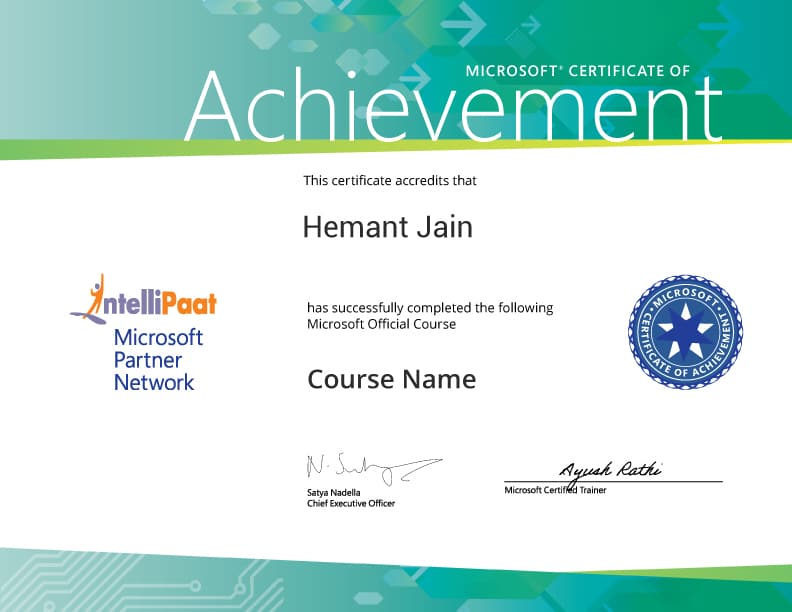 Click to Zoom
Click to Zoom
